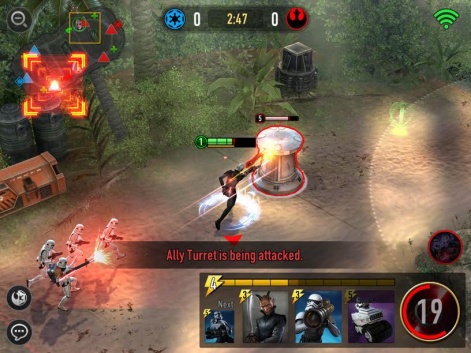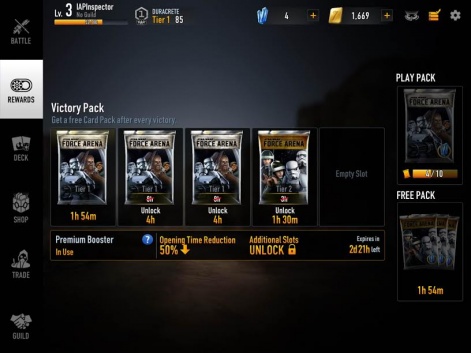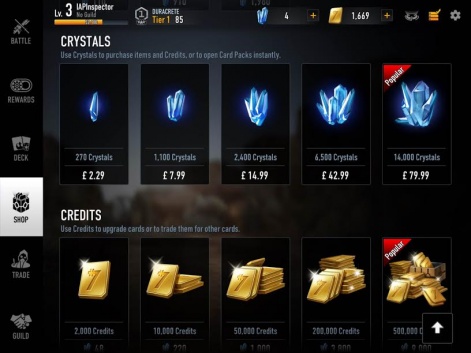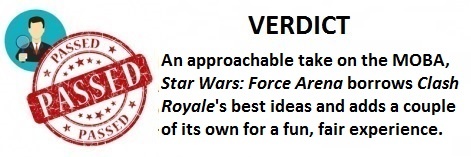Welcome back to the In-App Purchase Inspector - our regular look at free-to-play games from the consumer's perspective.
In each instalment, we consider the incentives or pressure applied to make in-app purchases, their perceived value, the expansion offered by IAPs and the overall value of the experience.
The end goal is to see whether the game makes a good enough case for us to part with our cash, or whether players are content - or engaged enough - to 'freeload'.
This time, we're taking a look at Netmarble's Star Wars-licensed MOBA-lite, Star Wars: Force Arena.
Breaking the curse?
There's a tag here on PocketGamer.biz called 'Curse of MOBA', a reference to the genre's initial struggles on the mobile platform.
Super Evil Megacorp is still making eSports headway with Vainglory but has never been among the upper echelons in grossing terms, and other competitors for the mobile MOBA crown such as Call of Champions have now been largely forgotten.
Clash Royale suggests the Curse of MOBA may now be broken.
However, while not a MOBA in the traditional sense, the fact that there's more than a whiff of MOBA DNA in Supercell's mega-hit Clash Royale suggests that the curse may now be broken.
And indeed, like Clash of Clans before it, it's already established a blueprint for others entering the genre. Even Smite developer Hi-Rez, after experimenting with arcade score-chaser Jetpack Fighter, is now going the Royale route with Smite Rivals.
Now with Netmarble entering the fray, and harnessing the Star Wars license to boot, there's another major competitor.
Leader of the pack
Gameplay-wise, Star Wars: Force Arena has plenty in common with Clash Royale.
Like in Supercell's effort, the aim is to destroy more of your opponent's turrets than they destroy of yours within a time limit.

You do this by deploying various, upgradeable cards, each with their own abilities. And at the end of each game, there's even a handful of cutesy emojis to choose from to get something off your chest. Sound familiar?
Netmarble heavily cribs from Supercell in the monetisation department.
The key difference comes in the form of Leaders - iconic series characters who lead the squad, and whose movements are controlled using on-screen taps - and this is what lends the game a sense of fluidity and complexity more akin to a traditional MOBA.
However, the similarities with Clash Royale are more than skin deep, as Netmarble also heavily cribs from Supercell in the monetisation department.
Delayed rewards
The most obvious example of this is in Star Wars: Force Arena's own take on Clash Royale's smart chest reward system.
Here, it's card packs rather than chests that you get in return for winning, but the function is the same - you can only unlock one at a time, and if all four slots are full up, your victories go unrewarded.

It's a smart way to encourage breaks in play and establish a habit of multiple returns per day, all without the harshness of a strict energy gate.
Delayed rewards help establish a habit of multiple returns per day.
And now we've seen Supercell pioneer the technique, games like this one riding on its coattails are to be expected.
One clever spin Netmarble puts on the system, however, is the availability of a Premium Booster that reduces the unlock time of rewards card packs by 50%, as well as adding an extra slot.
Even smarter is the fact that this Premium Booster is equipped as standard when you start playing, before expiring after three days. The idea, then, is to give players a taste of what they'll be missing later.
Keeping it tight
Besides the Clash Royale-esque rewards system, however, monetisation in Star Wars: Force Arena is pretty by-the-numbers.
There are two main currencies: Credits are the soft currency, Crystals are the hard. Crystals range from $2.99 for 270 to $99.99 for 14,000.

Gathering Credits is relatively quick and easy through standard play, which is enough to buy a good selection of cards in the in-game shop.
Crystals are a lot tighter though, with the currency hardly ever gifted. This means that to buy premium card packs or skip reward wait timers, you'll almost certainly be required to spend money.
But again, like Clash Royale before it, there's no particularly heavy pressure to spend here and the route to progression for non-payers is immediately clear.
If handled and maintained correctly by Netmarble, it has the potential to capture some of that lasting appeal.

















